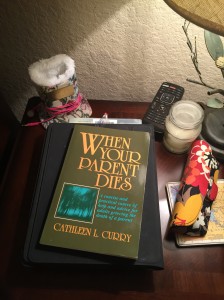Cancer check-ups: When you get breast cancer and you get past treatment, you get on a maintenance schedule with your doctors. I’m 2 1/2 years out from surgery. So every six months I get to see my cancer surgeon and my oncologist. Depending on the rotation, I’ll also get a blood work-up or a bone scan. Hopefully, after the five year mark, they will deem me a survivor, and I won’t have to go for my six months checkups anymore. Cancer will be just a thing that happened one time.
Looking good: I’m happy to report that I sailed through my check-up today. All scans and tests look great. And all my caregivers raved at how good I look. “Do you run?” asked one. “I can tell you work out”, said another. “Your new job must really suit you”….
I realize that the typical patient at the breast center is really very sick. Or scared. Or sick and scared. So in comparison, my doctors must find it refreshing to see someone like me with my hair washed, my makeup on, and my reconstructed breasts that make my closes fit nice. Their kind words make me feel good, and grateful for being so healthy.
The last check-up: Six months ago, at my last check-up, I was a mess. Oh the cancer tests and scans and exams were all glowing. But inside I was a mess. My mom had just died and I was grieving. I had also just given up alcohol, and was having a very tough time of it. I was having anxiety attacks at work, and I was feeling that my job was very insecure. I cried every day on my way home from the office, and sometimes I cried in the middle of the day. Like I said…I was a mess.
It’s amazing to look back at that time, and to see where God was working in my life. I couldn’t see his doings then, but I did pray and pray and pray to trust him. And by God, he delivered.
Grief six months later: I still grieve my mother, every day. But it is a rich, touching grief that makes me feel closer to her, and to God, and to others. I can feel my mom working in my life, and I am alert to her doings. Sometimes it makes me cry. Sometimes it feels like a tingling of my skin. Sometimes it’s a pulsing surge from my heart to my head. When I feel it, I welcome it, and praise God and thank Mom for being my guide.
Sobriety six months later: I’m still not drinking! I’m not craving alcohol anymore. Well, occasionally I crave it, but it passes, and I now have confidence that the craving will pass. I no longer come home after work to the automatic glass(es) of wine. I do other things like drink tea, or read, or write, or walk. I no longer get revved up about going out to meet friends, pre-drinking to get in the mood and drinking all night to feel connected. Now I drink tea and fancy waters. I actually find that I connect better sober. And I laugh better. And I don’t wake up regretting anything I said or drank the night before. Sobriety has been a bit of a buzz-kill in some of my circles, but in other circles no one even notices that I don’t drink. And in my own little bubble, sobriety has been a very positive kick-in-the pants. I should have done it long ago.
My job six months: I got a raise and a bonus, and a team to lead, and a new role and positions me for advancement. Things are moving in such a nice direction! There’s a lot of hard parts to my job, and it feels like a positive challenge. Like trying a new workout or learning a new skill. I still have a tension about needing to prove myself. But the encouraging voice in my head is louder than the doubting voice. I attribute this to surrounding myself with good people, who support me with their prayers and words of encouragement. And a recent development I’ve got a couple of potential clients for my consulting side-gig. God is good!
So tonight, for the record, I thank God for the good check-up. I thank God for the path he’s given me, and for being with me along the way. And I pray for the ability to trust and thank Him, even when things are a mess.

